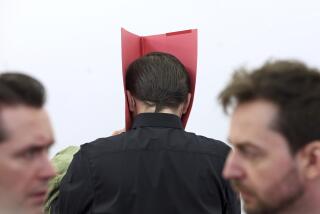Iran alleges U.S. is behind seizure of Baghdad envoy
Iran accused the United States on Tuesday of being behind the abduction of an Iranian diplomat in Baghdad, but U.S. officials refused to confirm that a kidnapping had taken place as the two countries’ campaign of finger-pointing was brought up another notch.
Iranian officials said Jalal Sharafi, their embassy’s second secretary, had not been seen since gunmen in Iraqi military uniforms intercepted his car Sunday as he left a branch of a state-owned Iranian bank.
“They acted under U.S. supervision,” Iranian Foreign Ministry spokesman Mohammed Ali Hosseini said in a statement released in Tehran. He described the incident as a “terrorist attack.”
The Bush administration has accused Iran of fueling the sectarian warfare in Iraq by providing Shiite Muslim extremists with weapons and explosives being used against U.S. troops and Sunni Arab targets. U.S. officials have been holding five Iranians seized last month in a raid in the northern city of Irbil. The Iranian officials are accused of planning attacks on Americans.
The seizure Sunday was another example of U.S. heavy-handedness, an official at the Iranian Embassy in Baghdad said. “They should release our colleague as soon as possible,” he said angrily.
Neither U.S. government nor military officials in Baghdad would confirm such an incident, much less the allegation that it had been orchestrated by American forces.
“We have no record of any event that looks remotely like the described abduction,” said Lt. Col. Christopher Garver, a U.S. military spokesman. The U.S. Embassy said it was “aware of the reports” and was looking into them.
Kidnappings are common in Baghdad, where high-ranking officials and ordinary merchants alike may fall prey to gangs looking to get rich by ransoming hostages. Iranian officials, however, refused to consider that Sharafi’s alleged abduction was anything but another attempt by Washington to put the squeeze on Tehran. They cited the detention of the Iranians in Irbil as evidence.
“This is not the first time such a thing has happened,” the Iranian Embassy official said of Sharafi’s alleged abduction. “Normally, the United States is responsible.”
As Iraq’s violence has escalated, so too has the tension between the United States and Iran, whose leaders deny bolstering Shiite militias at work in Iraq. The diplomatic snarling has put Iraqi Prime Minister Nouri Maliki in an awkward position as he tries to cultivate close relations with Iran while trying to convince American officials that he is serious about quelling violence.
A joint U.S.-Iraqi security plan announced last month has yet to produce tangible results, at least in the view of Iraqis living under constant threat of car bombs, mortar attacks, stray gunfire and street crime.
The bodies of at least 19 men, all shot to death and most showing signs of torture, were found in Baghdad on Tuesday, police and morgue officials said. In addition, at least five people died when a car bomb exploded in the east Baghdad neighborhood of Mashtal.
In the city of Kut, about 100 miles southeast of Baghdad, a roadside bomb targeting a passing U.S. military convoy instead blew up under a civilian minivan, killing a woman.
The U.S. military announced the death of a Marine in Al Anbar province, west of Baghdad, bringing the number of American troops killed since the March 2003 U.S.-led invasion to at least 3,103, according to the website icasualties.org, which tracks casualty figures in the war.
In the Shiite neighborhoods of Ur and Shaab, in northern Baghdad, residents said U.S. and Iraqi forces set up checkpoints Tuesday morning, snarling traffic for hours but doing little to reassure people of the new security plan’s effectiveness.
Majid Abdullah, 42, who owns an auto parts shop in Shaab, said that most checkpoints had been dismantled by afternoon and that those remaining were manned by Iraqis, with U.S. troops only passing by occasionally.
“Frankly speaking, there doesn’t seem to be anything different in their activities compared to any other days,” he said. “In fact, they don’t seem that enthusiastic and rarely ever search vehicles and passersby.”
Abdullah complained that he had gone through the checkpoint several times in his car and had yet to be searched. “I want to be searched. We want them to be more diligent.”
A resident of Ur said about 10 Strykers, hulking U.S. armored vehicles, had made their way through her neighborhood but become stuck on a narrow street. Unable to turn around, she said, the first Stryker rammed down the walls of a school and drove through it, followed by the rest of the convoy.
Maliki acknowledged delays in implementing the security plan he announced early last month and, after meeting with Iraqi military commanders, urged them to disprove skeptics who he said were doubting their ability or determination to stabilize Iraq.
“I address my speech to you, the Iraqi commanders, to prove and to show the world that you are up to the responsibility that is in your hands,” he said.
Abdullah, however, made clear he was not optimistic.
“It’s a new security plan every day, and there is all this hype about it when in fact it is not different and therefore will not make any difference,” he said. “It’s another disappointment.”
*
Times staff writer Raheem Salman and special correspondents in Baghdad contributed to this report.
More to Read
Start your day right
Sign up for Essential California for news, features and recommendations from the L.A. Times and beyond in your inbox six days a week.
You may occasionally receive promotional content from the Los Angeles Times.







